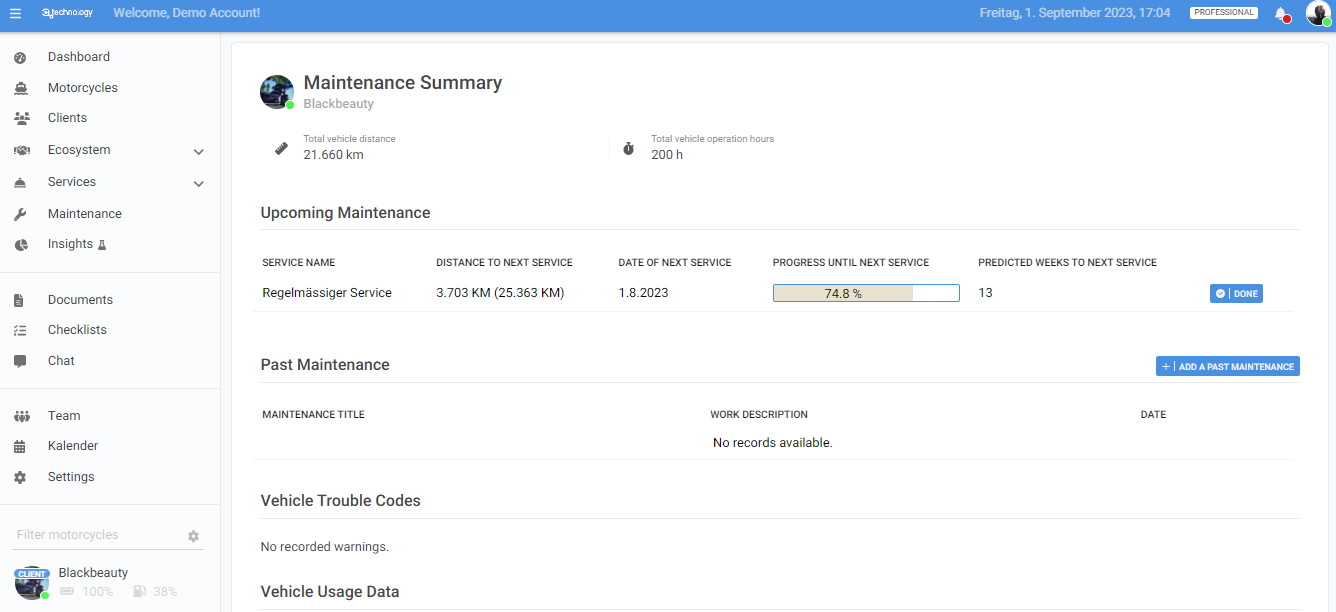Data Monetization in Mind
by Christian
No athlete hops off the couch to compete in a triathlon. They train, pay attention to how their body responds, and adjust accordingly to build stamina and ability. The same is true with IoT and connected vehicles. Yet, while manufacturers have the best intentions, initiatives are stalling out. According to Capgemini, only 21% of manufacturers are at an advanced stage of IoT innovation. Nearly 70% of manufacturing business executives in a recent McKinsey survey said their Cloud initiatives are stuck in pilot purgatory, unable to reach company-wide scale. As the powersports industry (a subset of the general category Vehicles and Mobility. Examples of powersport vehicles are boats, motorcycles, ATVs, snowmobiles and PWCs) continues to advance technologically, but is still in its early days compared to its big sibling, the automotive industry. Powersport manufacturers and their engine manufacturers (hereinafter condensed as "OEM”) have an unprecedented opportunity to leverage the vast amounts of data generated by their vehicles. By ensuring privacy and providing value-added services, OEMs can build mutually beneficial relationships with their customers while leveraging the monetization potential of vehicle data.
Introduction
The proliferation of connected technologies in powersports vehicles has led to the generation of extensive data sets that include diverse information such as driving patterns, vehicle diagnostics, maintenance requirements, and user preferences. Effective use and monetization of this treasure trove of data offers OEMs the opportunity to improve the customer experience, optimize product development, and develop new revenue streams.
Data collection and analysis
To effectively monetize vehicle data, the OEM need to have a comprehensive data processing pipeline. Integrated sensors, telematics systems and connected platforms enable the collection of relevant data points, including vehicle performance, usage patterns, location information and much more. Advanced data analytics such as machine learning and artificial intelligence can be used to extract valuable insights from the data collected, enabling better decision making and customer engagement.

Personalized services and enhancements
By analysing vehicle owner’s data, OEMs can gain insights into individual preferences, usage behaviour, and maintenance requirements. Based on this information, OEMs can provide personalized recommendations for vehicle customizations, performance enhancements and maintenance schedules. Offering customized products and services not only increases customer satisfaction, but also opens up opportunities for additional revenue streams through upselling and cross-selling.
Predictive maintenance and remote assistance
Data-driven insights can enable OEMs to implement predictive and preventive maintenance and based on it remote assistance. Predictive analytics algorithms can identify potential vehicle problems and notify customers in advance to minimize downtime and ensure optimal vehicle performance. OEMs can leverage this capability to offer premium maintenance packages, extended warranties and remote diagnostic services to promote long-term customer loyalty and generate recurring revenue. In addition, partners from the OEM, such as accredited dealers and authorized maintenance partners, can be served with such functions from a single source via the same software application. This also strengthens the connection to the partners and additional services can be sold not only digitally to the end customer but also to the partners, resulting in a dedicated software-as-a-service case.

Fleet Management and Analysis
For OEMs serving commercial or rental fleets, monetization of vehicle data can extend beyond individual customers. Aggregated fleet data can provide valuable insights into overall fleet performance, utilization rates, maintenance costs and fuel or battery efficiency. OEMs can provide fleet management platforms, analytics dashboards, and remote control and assistance for fleet operators to optimize operations and make data-driven decisions. These functions can also be resold to rental/fleet partners as attractive cross-selling products.
Strategic partnerships and Data Sharing
Collaborating with external players can be mutually beneficial when it comes to monetization. Powersports OEM can build strategic partnerships with insurance providers, third-party service providers, or smart city initiatives. By sharing anonymized and aggregated data, OEMs could contribute to the development of innovative insurance models, urban planning, and infrastructure improvements while generating revenue through data licensing agreements.

Particularly in the field of emerging electromobility, which is also causing a real boom in the powersports industry, data intelligence offers a wide range of advantages, as Co2 calculations and reports on greenhouse gas savings will be a decisive criterion for decision-makers in the authorities when it comes to using vehicles with sustainable drive systems. In addition, remote monitoring of batteries, range calculations and detection of anomalies is a decisive purchasing factor for the end customer when converting to electric drive.
Conclusion
As powersports vehicles become increasingly connected, OEMs possess an incredible opportunity to monetize customer data while delivering enhanced experiences. It is important to recognize that systems that can cover such a comprehensive topic must be continuously further developed and maintained. The operation and maintenance of a complex cloud infrastructure is a major challenge, ensuring flawless and modern applications - for example in the form of stat-of-the art mobile apps for end customers or remote assistance dashboards for professional partners - must not be neglected either, otherwise bad ratings will affect the overall solution in no-time. It is therefore advisable to focus on the core business of building unique vehicles and managing a complex supply chain, relying on trusted technology partners whose sole focus is cloud infrastructure, secure data processing and the operation and evolution of the associated state-of-the-art software.
Ready to kickstart the way you interact with your vehicle ecosystem? Start using c.technology systems. We would be happy to assist you as your trusted tech-friend.
Christian Fehr, Co-Founder and CEO c.technology AG
